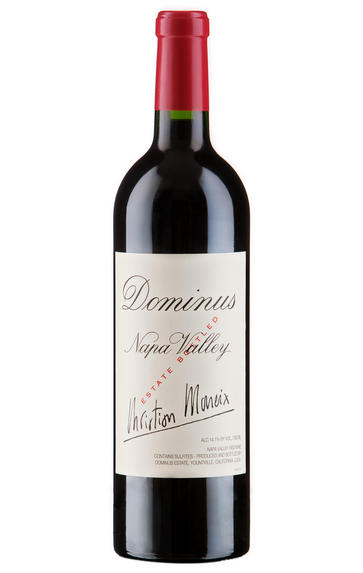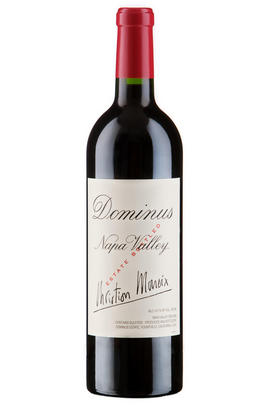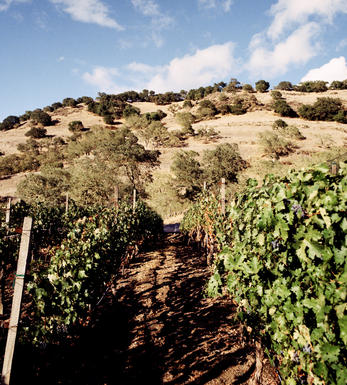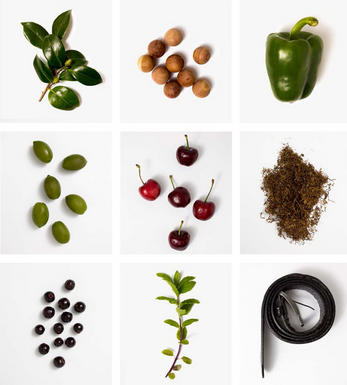
2019 Dominus, Napa Valley, California, USA

Critics reviews
The 2019 Dominus is shockingly primary. A wine of tremendous density and power, the 2019 is also a wine for readers who can be patient, as it won't be ready to drink for another 10-15 years! Dark fruit, leather, tobacco, incense, dried herbs and scorched earth lend striking complexity. The 2019 is a huge wine that needs time to come into its own. This is impressive, to say the least.
The 2019s from Dominus are stellar. As has been the case in many recent vintages, the Napanook Cabernet over-delivers big time. The Dominus Cabernet is shaping up to be one of the great wines of the vintage. Mostero describes 2019 as a year with a very rainy and cool May. He opened the canopies early to reduce disease pressure, which was a benefit in helping the grapes acclimate to warmer temperatures in light of the big heat spikes that arrived in mid-August and then in September, when temperatures soared over 100 degrees.
Drink 2029 - 2049
Antonio Galloni, Vinous.com (February 2023)
The 2019 Dominus is a blend of 90% Cabernet Sauvignon, 6% Petit Verdot and 4% Cabernet Franc, aged in 40% new French oak. Impressively dark-hued in the glass, it yields scents of cherries and cassis on the nose—or is it black cherries and redcurrants? Subtle notes of mocha, pencil shavings and almost Graves-like earthiness wind through the concentrated, medium to full-bodied palate, giving it a sense of savoury gravitas, while the finish is silky and long, leaving a lingering residue of soft tannins and mouthwatering freshness.
Drink 2023 - 2040
Joe Czerwinski, Wine Advocate (May 2022)
Lots of crushed stone, lead pencil and liquorice aromas that are highly aromatic and bright. Black cherries, cloves and purple fruit, too. Full body and a round and ripe centre palate with a juicy interior. It opens at the end with a savoury and juicy finish. Layered and beautiful.
Drinkable now, but it will be better in three or four years.
James Suckling, JamesSuckling.com (December 2022)
From a slightly more challenging year for this estate due to the heavy springtime rains, the 2019 Dominus is a classic blend of 90% Cabernet Sauvignon, 6% Petit Verdot, and the rest Cabernet Franc from this team brought up in a mix of new and used barrels. It offers a more ruby/plum and borderline opaque hue as well as a great nose of ripe currants, tobacco leaf, chocolate, and a touch of loamy earth. This round, supple, medium to full-bodied effort has soft tannins, terrific balance, and a great finish. It's not going to match the all-time greats here, but it’s a charming, endearing Cabernet that will offer incredible pleasure with just 3-5 years of bottle age and drink well for 20+ years or more.
Drink 2026 - 2048
Jeb Dunnuck, JebDunnuck.com (February 2023)
About this WINE

Dominus Estate
Dominus is now entirely owned by Christian Moueix (of Château Pétrus fame) and produces one of the finest Bordeaux style wines in California.
The fruit is sourced largely from the famed Napanook Vineyard located at Yountville in the Napa Valley. Some of the vines at Napanook are over 100 years old and it was one of the 3 vineyards from which the great vintages of Inglenook were produced. Dominus is a Bordeaux- style blend of Cabernet Sauvignon, Cabernet Franc, Merlot and Petit Verdot.
It is aged in one-third new oak barrels for 15 months. After a shaky start, Dominus is now a serious rival to Opus One and in recent years has arguably been the superior wine.

Napa Valley
North Coast's Napa Valley is California's most famous viticultural area (AVA), claiming some of the most expensive agricultural land in the world and producing wines of ‘cult’ status.
Its 16,000 ha of vines lie over a strip (40 miles long-5 miles wide) of diverse soils (clay, gravely, volcanic), with its northernmost end on the side of Mountain Helena and its foot in San Francisco Bay. The valley is framed by two mountains ranges Vaca (to the north) and Mayacamas (to the south), yet the main climatic influence is the cool wind and fog that is sucked in from San Pablo Bay during the afternoon, allowing grapes to ripen slowly and evenly.
The area enjoys a variety of unique microclimates, as temperatures can vary dramatically as much as 15 degrees, from the north to the south end of the valley. These differences have led to the creation of several sub-AVAs (14 in total) including:
Atlas Peak, Chiles Valley District, Diamond Mountain District, Howell Mountain, Los Carneros, Mt. Veeder, Oakville, Rutherford, St. Helena, Spring Mountain District, Stags Leap District, Yountville, Wild Horse Valley and Oak Knoll District. The Calistoga AVA is still pending approval.
Both the “Napa Valley” designation and the sub-AVA name must appear on the wine label simultaneously, with the exception of wines from the Carneros AVA, which is shared between the Napa Valley and the Sonoma County.
Cabernet Sauvignon is the undisputed king of Napa grapes, occupying over 45% of the vineyard acreage, followed by (predominantly) Chardonnay, Sauvignon Blanc, Chenin Blanc, Riesling, Zinfandel, Merlot, Cab. Franc and to a lesser extent Petite Sirah, Sangiovese, Barbera, Dolcetto.
Recommended Producers
Frog's Leap, Dominus, David Ramey, Viader, Stag's Leap Cellars, Paras Vineyards, Heitz.

Cabernet Sauvignon Blend
Cabernet Sauvignon lends itself particularly well in blends with Merlot. This is actually the archetypal Bordeaux blend, though in different proportions in the sub-regions and sometimes topped up with Cabernet Franc, Malbec, and Petit Verdot.
In the Médoc and Graves the percentage of Cabernet Sauvignon in the blend can range from 95% (Mouton-Rothschild) to as low as 40%. It is particularly suited to the dry, warm, free- draining, gravel-rich soils and is responsible for the redolent cassis characteristics as well as the depth of colour, tannic structure and pronounced acidity of Médoc wines. However 100% Cabernet Sauvignon wines can be slightly hollow-tasting in the middle palate and Merlot with its generous, fleshy fruit flavours acts as a perfect foil by filling in this cavity.
In St-Emilion and Pomerol, the blends are Merlot dominated as Cabernet Sauvignon can struggle to ripen there - when it is included, it adds structure and body to the wine. Sassicaia is the most famous Bordeaux blend in Italy and has spawned many imitations, whereby the blend is now firmly established in the New World and particularly in California and Australia.


Buying options
Add to wishlist
Description
The 2019 Dominus is shockingly primary. A wine of tremendous density and power, the 2019 is also a wine for readers who can be patient, as it won't be ready to drink for another 10-15 years! Dark fruit, leather, tobacco, incense, dried herbs and scorched earth lend striking complexity. The 2019 is a huge wine that needs time to come into its own. This is impressive, to say the least.
The 2019s from Dominus are stellar. As has been the case in many recent vintages, the Napanook Cabernet over-delivers big time. The Dominus Cabernet is shaping up to be one of the great wines of the vintage. Mostero describes 2019 as a year with a very rainy and cool May. He opened the canopies early to reduce disease pressure, which was a benefit in helping the grapes acclimate to warmer temperatures in light of the big heat spikes that arrived in mid-August and then in September, when temperatures soared over 100 degrees.
Drink 2029 - 2049
Antonio Galloni, Vinous.com (February 2023)
wine at a glance
Delivery and quality guarantee